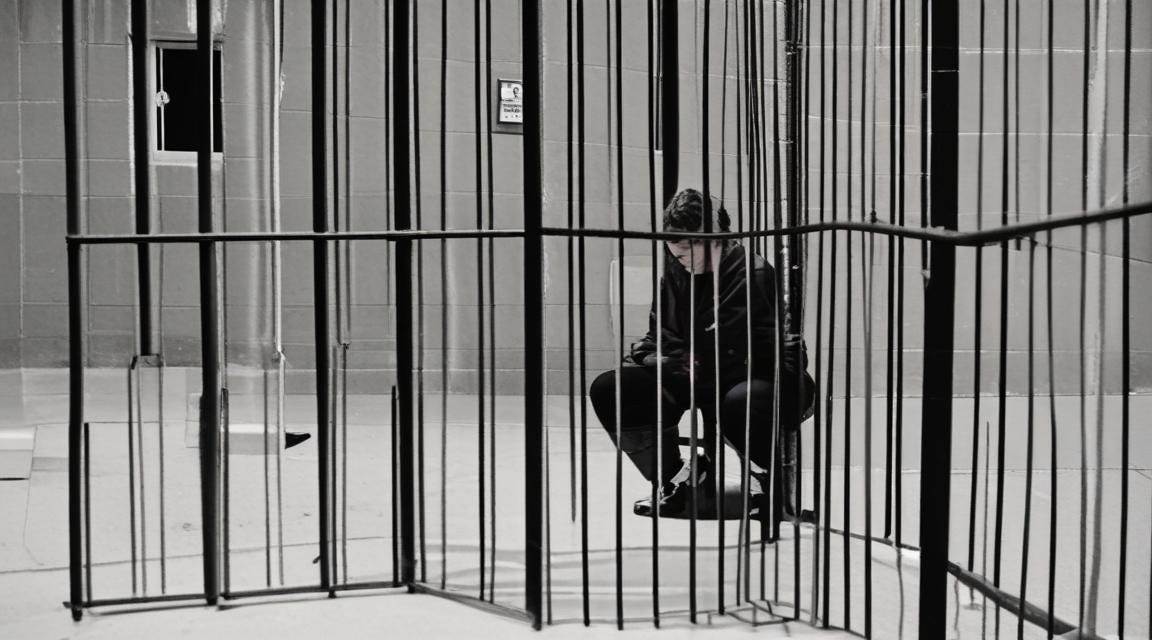Masked Justice: Reimagining Legal Systems for Universal Accommodation
legal systems should assume everyone involved could potentially be autistic and be unaware of if
Our legal system is built on a foundation that assumes neurotypicality as the default, leading to the pathologization and criminalization of behaviors that do not conform to this narrow standard. For neurodivergent individuals—particularly those masking conditions such as autism—this system often becomes a place of punishment rather than justice. Behaviors that are coping mechanisms, misunderstood responses to trauma, or expressions of neurodiversity are frequently treated as deviant, leading to disproportionate incarceration rates and systemic harm.
This essay proposes a radical reimagining of justice—one that assumes neurodiversity as the baseline and dismantles the punitive structures that disproportionately target and criminalize neurodivergent individuals. This vision of justice is not about separate accommodations but about a fundamental shift in how justice is conceived and administered for everyone. It is rooted in abolitionist thought, which seeks to dismantle the carceral state and replace it with systems of care, rehabilitation, and community support.
Neurotypicality as the Dominant Legal Norm
The contemporary legal system reflects broader societal structures that privilege neurotypical norms and criminalize deviation from them. From courtroom proceedings to sentencing guidelines, the assumption is that individuals will behave in predictable, "rational" ways, adhering to a set of behavioral norms that often exclude neurodivergent people. Neurodivergent behaviors—such as avoiding eye contact, difficulties with social cues, or flat affect—are often misinterpreted as signs of guilt, deception, or malice. This reflects a deep misunderstanding of neurodivergent experiences and creates a framework where neurodiversity is treated as a threat to social order.
The case of Matthew Rushin, a Black autistic man, exemplifies the systemic failures of a legal system that has no room for neurodivergent behaviors. Rushin’s harsh sentencing reveals how neurodivergent individuals, particularly those masking their autism, are disproportionately punished for behaviors that do not conform to neurotypical expectations. High-masking autistic individuals, in particular, often go undiagnosed and are punished for traits that are misread as malicious rather than understood as manifestations of their neurological differences.
This dynamic is rooted in the legal system’s overreliance on neurotypical standards to define acceptable behavior. Deviance is framed as moral failure or a threat, leading to punitive responses that fail to account for the full spectrum of human diversity. To create a more just legal system, we must shift away from these narrow definitions of acceptable behavior and adopt a framework that assumes neurodivergence as the norm.
The Disproportionate Criminalization of Autistic Individuals
Autistic individuals, especially those who mask their condition, are disproportionately entangled with the carceral state due to behaviors that deviate from neurotypical norms. The justice system tends to misinterpret autistic traits—such as difficulties with eye contact, flat affect, or struggles with social cues—as signs of guilt, deceit, or lack of remorse. These traits, when viewed through a neurotypical lens, lead to criminalization and harsher sentencing for autistic individuals who are perceived as uncooperative or dangerous.
Research shows that autistic people, particularly Black and brown individuals, are more likely to be criminalized for behaviors that are misunderstood by law enforcement and the courts. Autistic traits that may be responses to sensory overload or anxiety are often interpreted as resistance, defiance, or aggression during police encounters. An autistic person who fails to comply with verbal commands due to sensory overload or anxiety may be seen as uncooperative, leading to escalation by law enforcement officers who are ill-equipped to recognize neurodivergence.
Moreover, autistic individuals are more vulnerable to false confessions and wrongful convictions. Many autistic people, particularly those with lower verbal communication skills or those who mask their autism, may not fully understand the legal processes or the consequences of their actions during police interrogations. Under duress, they may agree to statements or confessions they do not fully comprehend, leading to wrongful convictions and imprisonment.
Prisons as Sites of Harm for Autistic Individuals
Prisons are inherently designed to control, punish, and enforce conformity through rigid structures, social hierarchies, and punitive measures. These environments are particularly harmful for autistic individuals, whose sensory sensitivities, need for routine, and difficulties with social interaction make them especially vulnerable in carceral settings.
Sensory Overload and Isolation: Prisons are loud, chaotic, and overstimulating environments—conditions that are particularly distressing for autistic individuals with sensory processing sensitivities. The constant noise, bright lights, and lack of privacy can lead to sensory overload, causing severe anxiety, meltdowns, or shutdowns. To manage these behaviors, prison staff may place autistic individuals in solitary confinement, exacerbating their distress. Solitary confinement becomes a site of profound harm for autistic individuals, leading to further mental health deterioration, increased anxiety, and trauma.
Social Hierarchies and Violence: Prisons operate on social hierarchies that reward conformity to certain behavioral norms, such as assertiveness and physical dominance. Autistic individuals, who may struggle with social cues, conflict resolution, and physical interactions, often find themselves at the bottom of these hierarchies. As a result, they are more likely to be targeted for violence, bullying, and exploitation by both inmates and prison staff.
Lack of Routine and Predictability: For many autistic individuals, routine and predictability are essential for managing anxiety and sensory sensitivities. Prisons, however, are environments of constant unpredictability and chaos. The lack of stability exacerbates the anxiety and mental health struggles that many autistic people already face, further compounding the harm inflicted by the carceral state.
Inadequate Mental Health Care: Prisons are notoriously under-resourced when it comes to mental health care, and autistic individuals often receive inadequate or inappropriate treatment for their unique needs. Instead of receiving autism-specific interventions, they may be misdiagnosed with other conditions or placed on medications that do not address their underlying neurological differences. This failure to provide appropriate care not only harms autistic individuals but also leads to cycles of behavioral escalation that result in further punishment and isolation.
Restorative Justice: Evolving Beyond Neurotypical Assumptions
Restorative justice offers an alternative to punitive systems, but it often operates under neurotypical assumptions. Expectations around emotional expression, eye contact, and verbal articulation of remorse can be difficult for neurodivergent individuals to meet. To accommodate neurodivergence, restorative justice must evolve beyond these norms and embrace diverse forms of communication and emotional expression.
Restorative justice processes should assume that participants may express themselves in non-traditional ways and create space for alternative forms of communication, such as written statements or mediated dialogues. Sensory-friendly environments, flexible timelines, and the inclusion of neurodiversity specialists could further ensure that restorative justice serves the needs of all participants, regardless of their neurological makeup. This approach does not require separate systems for neurodivergent individuals but instead ensures that restorative justice is universally accessible and responsive to the full range of human diversity.
Law is a Tool of Power, Not Justice
For much of my life, I regarded the law not with idealistic naiveté, but with a pragmatic belief that it was a flawed yet necessary mechanism for curbing abuses of power and delivering some semblance of justice. As I engaged more deeply with the world, my belief in the law’s efficacy began to erode—not abruptly, but gradually, over years of observation,…
Abolitionist Perspectives and Universal Care
Abolitionist thinkers like Angela Davis and Ruth Wilson Gilmore argue that prisons and punitive measures cannot address the root causes of harm and must be replaced with systems that prioritize care, rehabilitation, and community support. For neurodivergent individuals, especially those masking their conditions, punitive systems compound trauma and marginalization.
By assuming neurodivergence in everyone, we reject the idea that neurodivergent behaviors are deviations that need to be controlled. Instead, we build a justice system rooted in care, rehabilitation, and community support—one that values individuals for who they are, not how well they conform to neurotypical standards. This vision of justice aligns with abolitionist goals of dismantling the carceral state and replacing it with systems of care that prevent harm rather than perpetuate it.
Rejecting Needs Testing: Justice Without Proving Neurodivergence
The current legal system’s reliance on needs testing to determine who deserves accommodations is dehumanizing and counterproductive. It forces neurodivergent individuals to "perform" their neurodivergence to access justice, reinforcing the idea that support is a privilege rather than a right. In a system that assumes neurodiversity as the baseline, needs testing becomes unnecessary.
Universal accommodations would ensure that all individuals receive the care and support they need, without having to prove their worthiness. This approach challenges the ableist and neoliberal ideologies that dominate the current system, replacing them with a framework where justice is a right, not a privilege, for everyone.
Toward a Universal Justice System
A justice system that assumes neurodiversity as a baseline is not just a solution for neurodivergent individuals—it is a pathway to a more equitable and compassionate society for everyone. By rejecting neurotypical standards as the default and integrating neurodiversity into the core of legal practice, we can create a system that recognizes the full spectrum of human behavior and ensures that justice is administered fairly for all.
Achieving this vision will require sustained advocacy, education, and coalition-building. It will require us to confront entrenched power structures and resist institutional inertia. But the rewards of this transformation are clear: a justice system that is fair, compassionate, and responsive to the needs of all individuals, regardless of neurotype.


